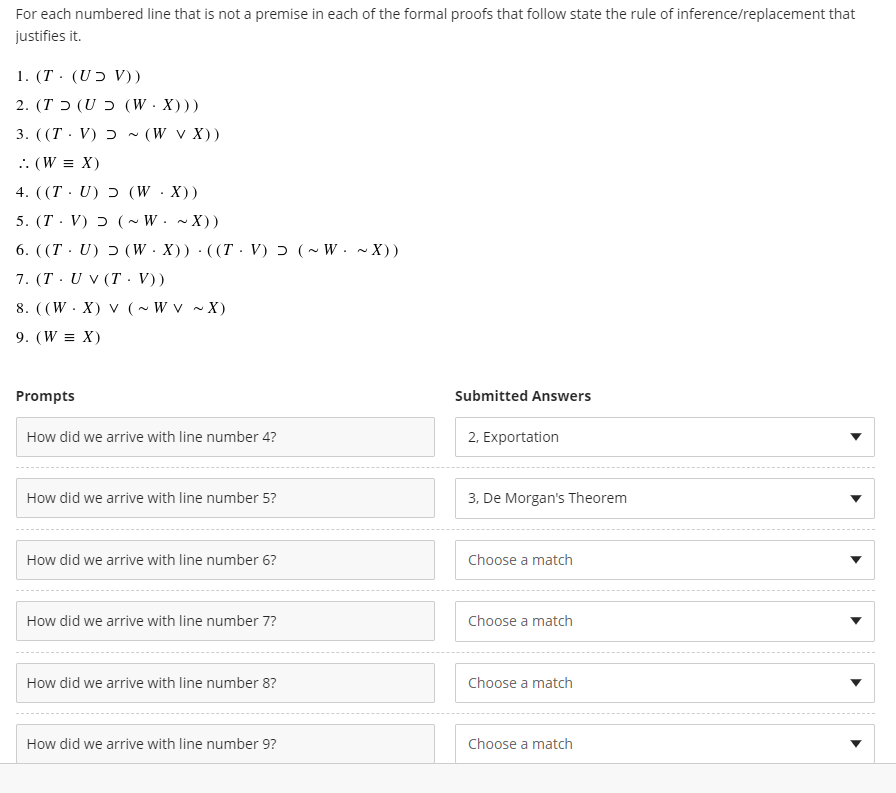For each numbered line that is not a premise in each of the formal proofs that follow state the rule of inference/replacement that justifies it. ( V - כ(UT) .1 ( ( (WX) כ U) כ T) .2 3. ((T · V) ɔ ~ (W v X)) .: (W = X) 4. ((T · U) ɔ (W·X)) 5. (T · V) ɔ (~ W . ~ X)) 6. ((T · U) Ɔ (W ·X)) ·((T· V) ɔ (~ W . ~ X)) 7. (T · U v (T . V)) 8. ((W· X) V (~W v ~ X) 9. (W = X) Prompts Submitted Answers How did we arrive with line number 4? 2. Exportation How did we arrive with line number 5? 3, De Morgan's Theorem How did we arrive with line number 6? Choose a match How did we arrive with line number 7? Choose a match How did we arrive with line number 8? Choose a match How did we arrive with line number 9? Choose a match
For each numbered line that is not a premise in each of the formal proofs that follow state the rule of inference/replacement that justifies it. ( V - כ(UT) .1 ( ( (WX) כ U) כ T) .2 3. ((T · V) ɔ ~ (W v X)) .: (W = X) 4. ((T · U) ɔ (W·X)) 5. (T · V) ɔ (~ W . ~ X)) 6. ((T · U) Ɔ (W ·X)) ·((T· V) ɔ (~ W . ~ X)) 7. (T · U v (T . V)) 8. ((W· X) V (~W v ~ X) 9. (W = X) Prompts Submitted Answers How did we arrive with line number 4? 2. Exportation How did we arrive with line number 5? 3, De Morgan's Theorem How did we arrive with line number 6? Choose a match How did we arrive with line number 7? Choose a match How did we arrive with line number 8? Choose a match How did we arrive with line number 9? Choose a match
Elementary Geometry For College Students, 7e
7th Edition
ISBN:9781337614085
Author:Alexander, Daniel C.; Koeberlein, Geralyn M.
Publisher:Alexander, Daniel C.; Koeberlein, Geralyn M.
Chapter2: Parallel Lines
Section2.CT: Test
Problem 3CT: To prove a theorem of the form "If P, then Q" by the indirect method, the first line of the proof...
Related questions
Question
need help asap please!!

Transcribed Image Text:For each numbered line that is not a premise in each of the formal proofs that follow state the rule of inference/replacement that
justifies it.
1. (T· (Uɔ V))
( ( (WX) כ (UT).2
3. ( (T · V) ɔ ~ (W v X))
.: (W = X)
4. ((Т. U) 5 (W .X))
5. (T · V) ɔ ( ~ W. ~ X))
6. ((T · U) ɔ (W ·X)) · ((T· V) ɔ (~ W. ~ X))
7. (T . U v (T. V))
8. ((W · X) v (~ W v ~ X)
9. (W = X)
Prompts
Submitted Answers
How did we arrive with line number 4?
2, Exportation
How did we arrive with line number 5?
3, De Morgan's Theorem
How did we arrive with line number 6?
Choose a match
How did we arrive with line number 7?
Choose a match
How did we arrive with line number 8?
Choose a match
How did we arrive with line number 9?
Choose a match
Expert Solution
This question has been solved!
Explore an expertly crafted, step-by-step solution for a thorough understanding of key concepts.
Step by step
Solved in 2 steps

Recommended textbooks for you

Elementary Geometry For College Students, 7e
Geometry
ISBN:
9781337614085
Author:
Alexander, Daniel C.; Koeberlein, Geralyn M.
Publisher:
Cengage,

Elementary Geometry for College Students
Geometry
ISBN:
9781285195698
Author:
Daniel C. Alexander, Geralyn M. Koeberlein
Publisher:
Cengage Learning

Elementary Geometry For College Students, 7e
Geometry
ISBN:
9781337614085
Author:
Alexander, Daniel C.; Koeberlein, Geralyn M.
Publisher:
Cengage,

Elementary Geometry for College Students
Geometry
ISBN:
9781285195698
Author:
Daniel C. Alexander, Geralyn M. Koeberlein
Publisher:
Cengage Learning